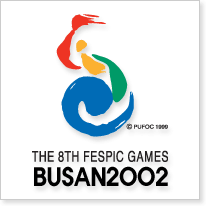
The 1984 International Games for the Disabled, canonically the 1984 Summer Paralympics, were the seventh Paralympic Games to be held. There were two separate competitions: one in Stoke Mandeville, England, United Kingdom for wheelchair athletes with spinal cord injuries and the other at the Mitchel Athletic Complex and Hofstra University on Long Island, New York, United States for wheelchair and ambulatory athletes with cerebral palsy, amputees, and les autres [the others]. Stoke Mandeville had been the location of the Stoke Mandeville Games from 1948 onwards, seen as the precursors to the Paralympic Games, as the 9th International Stoke Mandeville Games in Rome in 1960 are now recognised as the first Summer Paralympics.
WheelPower is the national organisation for wheelchair sports in the United Kingdom, and aims to help people with disabilities improve their quality of life.

The FESPIC Games or the Far East and South Pacific Games for the Disabled, was a multi-sport event in Asia and the South Pacific region which is considered to be a precursor to the Asian Para Games, as two of its edition games in 1999 (7th) and 2002 (8th) were held parallel to the 1998 Asian Games and the 2002 Asian Games.

The 2010 Asian Para Games, also known as the First Asian Para Games, was a parallel sport event for Asian athletes with a disability held in Guangzhou, China. Two weeks after the conclusion of the 16th Asian Games, It opened on December 12 and closed on December 19, 2010.

The Asian Para Games, also known as Para Asiad, is a multi-sport event regulated by the Asian Paralympic Committee that's held every four years after every Asian Games for athletes with physical disabilities. Both events had adopted the strategy used by the Olympic and Paralympic Games of having both games in the same city. However, the exclusion of Asian Para Games from Asian Games host city contract meant that both events ran independently of each other. The Games are recognized by the International Paralympic Committee (IPC) and are described as the second largest multi-sport event after the Paralympic Games.
Paralympics Australia (PA) previously called the Australian Paralympic Committee (APC) (1998–2019) is the National Paralympic Committee in Australia for the Paralympic Games movement. It oversees the preparation and management of Australian teams that participate at the Summer Paralympics and the Winter Paralympics.

2003 FESPIC Youth Games, the 1st and only FESPIC Youth Games in history(Chinese: 2003年第一屆遠東和南太平洋地區青年殘疾人運動會、2003年第一届远东和南太平洋地区青年残疾人运动会、第一屆遠南青殘會、第一届远南青残会), were an Asia Pacific regional youth disabled multi-sport event held in Hong Kong, China from 23 to 27 September 2003. Around 314 athletes from 15 participating nations participated at the games which featured 5 sports. Hong Kong is the only nation that had hosted the FESPIC Youth Games, and it was the first and only time Hong Kong hosted the event. The games were opened by Tung Chee Hwa at the Ma On Shan Sports Ground. In 2006, both the FESPIC organisation and the event were officially defunct and succeeded by the Asian Paralympic Committee and the Asian Youth Para Games respectively.

The Commonwealth Paraplegic Games were an international, multi-sport event involving athletes with a disability from the Commonwealth countries. The event was sometimes referred to as the Paraplegic Empire Games and British Commonwealth Paraplegic Games. Athletes were generally those with spinal injuries or polio. The Games were an important milestone in the Paralympic sports movement as they began the decline of the Stoke Mandeville Games' dominating influence. The event was first held in 1962 and disestablished in 1974. The Games were held in the country hosting the Commonwealth Games for able-bodied athletes, a tradition eventually fully adopted by the larger Olympic and Paralympic movements.
Kevin Francis Betts, OAM was a sports administrator known for his work in the Paralympic movement in Australia and his founding work related to wheelchair sports in New South Wales.

Kristy Pond is an Australian athletics competitor. She was selected to represent Australia at the 2012 Summer Paralympics in athletics in the 100 metre and 200 metre events. She did not medal at the 2012 Games.

The 2006 FESPIC Games, officially known as the 9th and Final FESPIC Games, was an Asia-Pacific disabled multi-sport event held in Kuala Lumpur, Malaysia, from 25 November to 1 December 2006. This was the first and last time Malaysia hosted the games. Malaysia is the eighth and the last FESPIC organisation member to host the FESPIC games after Japan, Australia, Hong Kong, Indonesia, China, Thailand, and South Korea. Around 3,641 athletes from 46 nations competed at the games which featured 19 sports. The games was opened by Prime Minister of Malaysia, Abdullah Ahmad Badawi at the KLFA stadium.
George Colliver Dunstan, AM is an Australian sports administrator who has played a leading role in the development of Paralympic sport in Australia particularly in terms of sport administration.
John MacDonald Falconar Grant, AO, OBE was an Australian neurosurgeon and disability sport administrator. He was president of the 2000 Sydney Paralympic Games Organising Committee. He played a leading role in the development of disability sport in Australia.

The Third Commonwealth Paraplegic Games was a multi-sport event that was held in Edinburgh, Scotland from 26 July to 1 August 1970. Dubbed the "little games", they followed the 1970 British Commonwealth Games which were held in Edinburgh from 16 to 25 July of that year.

The 1999 FESPIC Games, officially known as the 7th FESPIC Games, was an Asia-Pacific disabled multi-sport event held in Bangkok, Thailand from 10 to 16 January 1999, 20 days after the 1998 Asian Games. It was one of the two FESPIC Games to have held at the same host city as the Asian Games, the other being the 2002 FESPIC Games in Busan, South Korea.

The 2002 FESPIC Games, officially known as the 8th FESPIC Games, was an Asia-Pacific disabled multi-sport event held in Busan, South Korea from 26 October to 1 November 2002, 12 days after the 2002 Asian Games. It was one of the two FESPIC Games to have held at the same host city as the Asian Games, the other being the 1999 FESPIC Games in Bangkok, Thailand.

The fourth Commonwealth Paraplegic Games were held in Dunedin, New Zealand from 13 to 19 January 1974. The Games were opened by Sir Denis Blundell, Governor-General of New Zealand.
Victor Salvemini was an Australian Paralympic athlete from Western Australia. As a wheelchair athlete, he competed in several sports including archery, basketball and track sprinting in the 1970s. A paraplegic, he lost the use of both his legs after a car accident in Fremantle, Western Australia in 1961 when he was 14 years old.
Keith Bremner was an Australian Paralympic Shooter, who participated in other sports at International Paralympic Games. He competed at four successive Summer Paralympics from 1984, FESPIC Games, International Stoke Mandeville Games, World Shooting Championships, Oceania and Korean Shooting Championships for the Disabled. He was Chairman and long-term member of the Paraplegic and Quadriplegic Association of New South Wales, and long-term member of Wheelchair Sports New South Wales.
Fred Nitz is a wheelchair athlete from Queensland who represented Australia at the 1982 Far East and South Pacific (FESPIC) Games for the Disabled in Hong Kong winning three gold medals and 2 silver medals..











